Acting No Experience Resume Examples and Templates
Acting is a competitive industry, and breaking into acting when you have no experience is tough. You’ll need an acting resume to get started, but it isn’t easy to create an impressive resume when you don’t have any previous roles. Acting resumes shouldn’t contain any non-acting experience, so you may not have much you can use to fill up a page.
Fortunately, you can still land auditions when you have no acting experience. Everyone has to start from nothing. As long as you follow the standard acting resume format, attach a good headshot, and showcase the right skills, you can have your no-experience acting resume ready in no time.
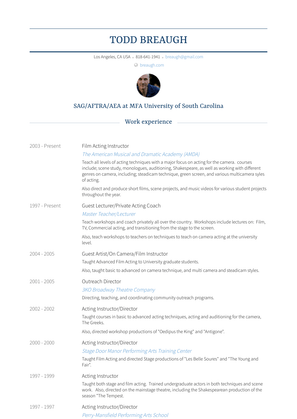
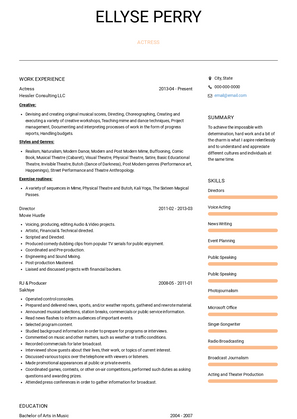
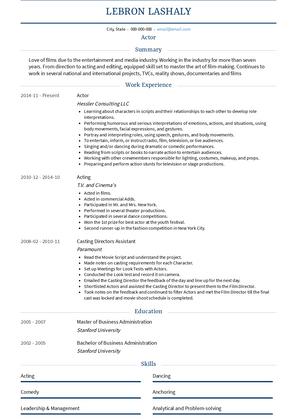
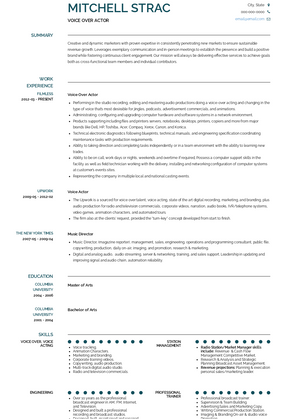
What is an acting resume?
An acting resume is a little different from a standard resume. In an acting resume, you list your acting credits and education only. You don’t include dates, job descriptions, or any experience unrelated to acting. You can include roles in film, television, theatre, and very little else.
Further, unlike in most resumes, your picture is one of the most important parts of your acting resume.
With most jobs, you would never include a picture with your application. When you are auditioning for acting roles, however, you won’t even be considered without a professional headshot. Casting directors will check your headshot first, then skim your resume to see previous roles and contact information.
Your specific skills and technical knowledge are not as important as your acting credits, your resume is less important than your headshot, and your headshot is less important than the audition. You still need a resume, but when you start auditioning for parts it’s important to make sure you have a professional headshot and real acting chops if you want to land a role.
How to write an acting resume with no experience
It’s difficult to write an acting resume with no experience, but every movie star had no credits when they first started out. As long as you have a great headshot and you follow the right acting resume format, you have a shot at landing your first role.
Here’s how to write an acting resume when you don’t have experience.
1. Find the right resume template
A great resume template can be a huge boost for your acting resume. Acting is a very visual profession, and you need to show that you have good taste, right from the beginning. An simple but eye-catching resume template will show the hiring manager or casting agent that you have personality, before they even meet you.
Traditionally, acting resume templates are basic in design. The more visual aspects will come from your headshot and, if applicable, demo reel.
At VisualCV, a template like Monte or Monaco would work great for acting resumes with no experience. They allow for simple formatting, tasteful white space, and are easy to keep to one page. You can even customize the text with some subtle colour that enhances the design.
These templates also allow you to include a photo, right on the page. While you will have to attach a separate headshot for most auditions, including an additional picture directly on the resume can be a great way to ensure the casting director doesn’t forget your face, even if your resume is mistakenly separated from your headshot. This is also a great way to fill up space on your resume when you don’t have many credits to your name.
One thing to keep in mind when selecting a template is that your acting resume should not be longer than one page. In some cases, you will have to attach your resume to the back of your standard 8 x 10 headshot, so any additional pages will be ignored. Make sure to choose a template that you can easily edit and customize to fit on a single page.
Once you’ve chosen the right acting resume template, you can get started writing your acting resume.
2. Include your personal details
The first thing you need to include in your acting resume is your contact information. The rest of your resume isn’t worth much if your contact information isn’t correct.
Include your name, phone number, email address, and city of residence.
If you have a professional online profile, you may want to include a link to it in your contact information section as well. A professional website, with your picture, credits, and a demo reel, can make you look like a credible working actor.
If you already have an agent or manager, you can include their contact information as well.
Many casting companies also require you to list your personal physical characteristics. List your height, weight, and eye colour on your resume. If you are underage you can also include your age, but exclude this detail if you are over 18.
In the past, it was common to list hair colour as well, but this is no longer necessary in the age of colour photography. The picture you include with your resume should make it clear what your hair looks like. Your full-size headshot should be attached to the back of your acting resume when you submit it for an audition, but you can also include a smaller one directly on the resume as well. This should help to take up space in your no-experience resume, and it helps ensure your face is closely associated with your resume at all times.
When you include a photograph, make sure it’s a professionally taken headshot that suits the requirements laid out in the casting call. Most casting directors have very specific guidelines about their submission process, so it’s important to get everything right. A selfie or a candid picture from your cousin’s wedding aren’t going to be good enough to include on your resume.
In some jurisdictions, you may also have to include your union membership or guild affiliation, like SAG or ACTRA. Add this to your personal details section.
3. Write an intriguing summary
In an acting resume, a Summary is optional. Your headshot and previous roles are generally the only summary a casting director will be looking for. If you have no experience, however, a brief summary can help capture their attention.
As an actor, you should love to be the centre of attention. Whether you’re up on the stage or starring in commercials, you must be able to thrive when there are lots of eyeballs pointed at you. This is a great asset when writing an acting resume with no experience.
In a resume, your Summary section is your elevator pitch to an employer. It’s where you can quickly list some highlights from your skill set and career to showcase what you are capable of. Located near the top of your resume, your Summary section should be attention-grabbing enough that it convinces the casting director to keep reading.
As an actor with no experience, your resume summary should highlight what will make you perfect for the role. This could mean mentioning your performing arts education, participation in acting workshops or seminars, or your experiences on set in a non-acting capacity.
4. Include any previous roles
Generally, a resume section listing your acting experience is a key part of an acting resume. If you have no acting experience, you may not have much to include in this section, but it’s still important to know the right format.
When listing previous experience, you can choose to list your roles in reverse-chronological order, with the most recent first, or in order of importance. Reverse-chronological resumes are more typical, but if you have one particularly impressive role you’d like to highlight, such as a starring role or experience with a well-respected director, you may want to list that one first so it can’t be missed.
When listing credits, you may want to create separate sections for stage productions, commercials, and television/film.
Listing film and television credits
For your film and television section, use three columns to list your roles. List the name of the production in the first column, the type of role you held in the second, and the production company and director in the third column. You don’t need to list the character name.
Film/Production title | Role type | Production company, director
Voice over roles can also be included. Voice acting is still acting.
Of course, if you have no acting experience, you won’t have roles in professional film or television productions. If this is the case, roles in student films and amateur productions are perfectly acceptable. In fact, acting in unpaid student films or online videos are great ways to gain experience.
Scene work from your acting classes and workshops can also be added here when you have no more substantial roles.
Listing theatre credits
For theatre roles, use three columns to list your roles. List the name of the show in the first column, your role in the second, and the names of the theatre company and director in the third. Here you can include school productions, community theatre productions, and broadway shows, as the case may be. Understudy credits are also acceptable here.
None of your theatre roles should include a date.
Show title | Character name | Theatre company/director
Listing commercial credits
If you have acted in commercials, you may want to include these in your resume as well. For commercials, you can list the ad agency in the first column, the role in the second column, and the production company and director in the third. You do not need to list the product that was being advertised, or the date the commercial was made.
What not to include
When you have no experience, you may not have any roles to list. If you have no roles in theatre, television, film, or commercials, don’t include that section in your resume.
You might be tempted to include your non-acting roles in the film or theatre industry in this resume section if you’ve worked as a member of the crew, but this isn’t necessary. While useful show-business experience, this isn’t acting experience. The Credits section of your resume should only include acting experience. If necessary, you could include a Related Experience section that includes some on-set roles, but only if you really have no acting experience to show.
Experience as an extra or background actor should be left off of your resume as well, unless these are your only roles. Acting in the background of a shot, when you have no lines, does not count as “acting” to a casting director.
Acting resume example: Previous roles
Short Films The Two Sams | Supporting | Toronto Fine Arts College, Samuel Smithe
Theatre A Midsummer Night's Dream | Puck | Theatre Acting Workshop, Toronto Fine Arts College Waiting for Godot | Vladimir (understudy) | Acting Workshop, Toronto Fine Arts College
5. Include your acting training and education
If you are writing an acting resume with no experience, your training and education section is one of the most important parts of your resume. Because you don’t have roles or work experience to showcase, your acting education is an important asset.
Your acting education might include an acting degree from a credentialed arts university. If this is the case, list the school, the name of your degree or diploma, and the dates you studied. In the description of your acting degree, you could include specific classes or specializations that you want to draw attention to. You may also want to note awards, related extracurriculars, or some of the school productions you were involved in. If you studied under a well-known acting professor, you may want to note their name as well.
You can also list individual acting classes, workshops, and seminars, as well as any other acting training you may have completed. While you might not have professional acting experience, your experience in acting school can be an important asset.
Scene Study | Sam Sanders | Scarborough Acting Studio Iprov | Singing Shrimp Improv School BFA, Acting | Toronto Fine Arts College, 2021
6. List your special skills
In an acting resume with no experience, your special skills are integral. Even if you don’t have experience, you might be the right person for a role if you have the right skills.
For an actor, special skills refers to performing abilities, like accents, language proficiency, dialects, musical ability, dancing, or level of fitness. You might not have acting experience, but the ability to speak another language, do a backflip, or sing classic broadway songs might be an asset for the specific role.
When listing your special skills, make sure they are all things you can do right on the spot. Don’t say you can imitate a Boston accent or do a handstand if you won’t be able to do it on demand, in the middle of an audition. Your special skills can be what get you a role, and failing to back up your claims can be what gets you rejected.
Special Skills
- Singing
- Saxophone
- Fluent in French
- Handstands
- Costume construction and cosplay
7. Consider optional sections
Once you’ve included all of the mandatory sections in your acting resume, you can consider some additional sections to fill out the page.
Experienced actors might include an Awards section, if they have received any accolades or recognition for their acting work. Even if you have no experience, you might have some awards from your acting school, student film festivals, or community theatre participation that you can include in this section.
You may also want to include a References section. This is rare, and most experienced actors will not include references, but if you have no experience and you still have space to fill on your one-page resume, including a short list of references is acceptable.
8. Attach your headshot
While all of the above is important, at the end of the day, you aren’t going to be cast if you aren’t right for the part, and casting directors won’t know if you’re right for the part if you don’t have a headshot. Make sure you have a professionally taken headshot that clearly shows your face. Traditionally, headshots are 8x10 inches, and stapled to the back of your resume in the top two corners. This makes it easy for casting directors to reference after you have auditioned.
In many ways, the headshot is actually more important than the resume. Casting directors are usually hunting for someone in the right demographic with the right look, so if you don’t fit the description, they won’t even read your resume.
If you have a demo reel, you may want to include this with your resume as well. Filmed evidence of your acting skills are a major asset, and is likely more impressive than your resume.
9. Customize your resume
It’s important to customize your resume for every application. In an acting resume, this means making sure the right credits and skills are emphasized.
If you are hoping to land a role in a comedy, make sure you mention your improv classes or stand-up comedy skills in your resume. If you are auditioning for a serious indie drama, mention your acting classes with a well-known drama teacher.
If you can highlight the skills and experience that are most relevant to the role, the casting director will be more likely to give you a chance.
Acting no experience resume example
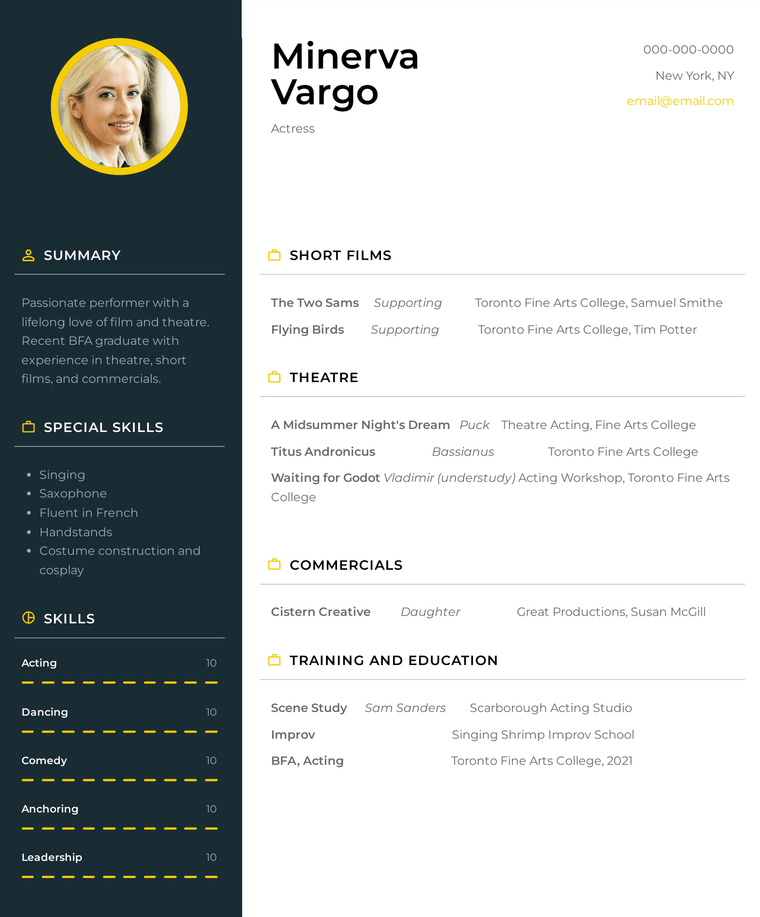
Copyright ©2025 Workstory Inc.
